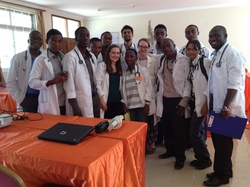Katharine Rae's Reflection - Weill Bugando Rotation
Dr. Katharine Rae (Pediatrics) completed a rotation at Weill Bugando in Mwanza, Tanzania, in March-April 2013

One of the things that drew me to the Cornell Pediatrics residency program was the chance to participate in the Tanzania rotation. I have done another trip somewhat similar in medical school where I went to the Dominican Republic and had an amazing experience. So of course I wanted to go to another country, understand the culture, practice medicine in a resource-limited environment, teach, live and have a different experience. On my other trip we would reflect weekly in a group, which we also did at Bugando; those of us at Serengeti house would talk often about our experiences. I was also able to reflect both with attendings in Tanzania and with my program director here in NYC. On my other trip we would end our discussions with what was our biggest challenge, what was our biggest success, and what we are going to take back with us. This exercise allowed us to focus on problems, remind us of successes and help us to put this trip in perspective and I have tried to keep this format in mind here.
My biggest challenge was accepting the realities of medicine in Tanzania compared to the US. I initially felt guilty that we have so much at home and that one of the biggest hospitals in Tanzania had so little. But, one of the goals of this rotation is to understand how to practice medicine in a resource-limited setting. It was hard to see so many sick and dying children, but Bugando was providing what they could. There were kids who got better, but there were also children who could not be helped and they were discharged or passed away. Amazingly, even these families were grateful for whatever we could do and appreciated our efforts even if the outcome was bad. It seemed that everyone I met in Tanzania was more kind and giving than most people I know in the US. Doctors and patients embraced what they had and still maintained standards in their care. They followed WHO guidelines and attempted to learn and improve. I realized while being there that I was focusing on the wrong things. I needed to try and learn from them about what they do have and can help rather than dwelling on what they might lack.
Even with the challenges I am sure everyone would be able to identify a success. I consider my teaching my success there. I wasn’t sure if going as a second year would be too early to feel confident enough to teach and run teams independently. But, I was proud of my ability to organize topics, teach exams, go to the bedside with students, and see them progress in front of me. I was teaching very new medical students but I feel proud that I was able to contribute to their learning. Physical exams are so important in a resource limited setting so I strove to teach extremely thorough and useful physical exam techniques that hopefully will serve them well. I was amazed at the amount of knowledge and skills I have. It is easy to rely on the internet to look things up but I realized that I was able to teach without constant access to many resources.
There are many things I have brought back with me. I hope to keep a part of the more relaxed and appreciative way of life that I experienced in Mwanza. I loved having time to talk to friends, communal dinners, going out for a drink, playing cards, reading, or just sitting around enjoying the weather. Everyone was so kind and personable I hope I keep the custom of introducing everyone, taking moments to say hello and ask how they are doing, even when walking down the street. I hope I stay close with my Serengeti house friends. Finally, the most important thing I brought back with me is a confidence in myself as a doctor. This is invaluable going into third year when I take on even more responsibility in teaching and managing others. Being able to teach off the top of my head in Tanzania made me realize how far I have come since intern year. And, if I can successfully manage a team of medical students and interns from another country talking to patients in another language about diseases I have never seen before, then being a senior in the US shouldn’t be more difficult.
I really enjoyed my rotation in Tanzania for so many reasons. There were challenges but reflecting on them improved my experience. The successes made me feel like I was actually making a difference and that my presence contributed something to the Bugando health system. There are so many personal insights and experiences that I can bring back and make relevant in my life as a resident at Cornell.
Weill Cornell Medicine Center for Global Health
Center for Global Health
420 East 70th Street, 4th Floor, Suite LH-455
New York, NY 10021
Phone: (646) 962-8140
Fax: (646) 962-0285

